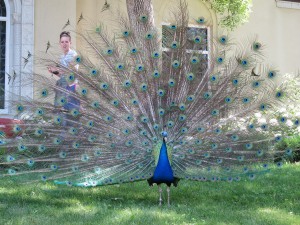As I approach my 50th birthday, I’ve been having fun coming up with various lists of 50 things – 50 people I want to meet, 50 sitcoms I’ve watched at some time in my lifetime, 50 quotes I like, etc.
Among the lists of lists, I gen’d up two of books I want to read (50 is far too small a number for either list, but it fits with the age thing): 50 books I own that I have yet to read - I have many, many more than that, and 50 books that I do not own that I want to read. Of course, if I ever read any of them, I will likely find myself adding to my library (no surprise there).
Physics of the Impossible by Michio Kaku happened to be first on my list of books that I do not own that I wanted to read. I picked it up last Monday when returning A Confederacy of Dunces to the library. I hadn’t planned on getting it – I was only looking to see if it was in – but was taken in immediately by the subtitle: “A Scientific Exploration into the World of Phasers, Force Fields, Teleportation, and Time Travel”. Not unlike Star Trek – I’m Working On That by William Shatner and Chip Walter, the book promised a survey of science fiction concepts becoming a reality, but very unlike Shatner’s book, here was a theoretical physicist doing the looking and explaining why something could not be done or how it might.
It’s a rare scientist (or engineer for that matter) who is truly respected by his/her peers for research results/theories who can also communicate to the masses. Richard Dawkins certainly made that leap (his early books are more academic than his later works). When it comes to physicists, I think the pool shrinks. Stephen Hawking did a marvelous job conveying cosmological concepts in his books, as did Brian Greene – though Green’s books, while quite readable, are still fairly technical for the average person.
Michio Kaku writes a very readable book…for a physicist who is the co-founder of string field theory. Perhaps that is an unfair qualification. I have known many physicists who are wonderful conversationalists, but I don’t know if they are so because I am interested in their subjects or that they are simply wonderful conversationalists with everyone. Regardless, Kaku writes as one of those wonders. Peppered throughout this book are references to other books (a lot of fiction), a few movies, some history of the people and science behind the science. Those may make Kaku more accessible to the average reader, but I think it just shows that he has a life outside of theoretical physics.
In Physics of the Impossible, Kaku looks at science fiction to see what might possibly become science fact. He breaks down his subjects into three classes of impossibilities:
- Technologies that are impossible today, but do not violate known laws of physics and may be possible in some form in this or the next century (these are force fields, phasers, Death Stars, ETs and UFOs, teleportation, starships/antimatter engines, antimatter universes and certain forms of telepathy, psychokinesis and invisibility.)
- Technologies that “sit at the very edge of our understanding of the physical world.” They may not be possible at all, and if so, will likely only be possible thousands or millions of years in the future (these are time machines, hyperspace and wormhole travel as forms of travel faster than light, and parallel universes.)
- Technologies that violate the known laws of physics, which if possible, will result in a fundamental shifting of understanding of physics (Kaku notes there are surprisingly few such impossibilities, examining only perpetual motion machines and precognition).
Of course, one should read the book before thinking that Star Trek’s transporters, phasers, warp engines, or shields (force fields) could ever become a reality. I won’t spoil your read by revealing what the “certain forms” might be, but you can guess that Dr. McCoy won’t be complaining about having his atoms scattered across the universe for many centuries to come.
I was intrigued by Kaku’s discussions of what one would call paranormal, but after he gently observes that there has never been any real evidence for telepathy, psychokinesis or precognition, he explains the physics behind how one might be able to realize a part of the first two (precognition violates the known laws of the universe, thus cannot be performed through any technology...but is not completely impossible.) I liked his summary of science and psychokinesis:
One problem with analyzing psychokinesis scientifically is that scientists are easily fooled by those claiming to have psychic power. Scientists are trained to believe what they see in the lab. Magicians claiming psychic powers, however, are trained to deceive others by fooling their visual senses.
He’s fair where research has had some seemingly positive findings, but does note that “fully half” of the successful trial of the Princeton Engineering Anomalies Research Program “originated from a single individual” and that the results are always non-reproducible.
The lesson here is that while almost nothing is impossible (what scientists really mean is that these ideas are impossible for primitives such as us), the technology needed to overcome the impossible is impossibly advanced.
So, I strike one from one list and add at least seven, as I now want to read Kaku’s other books. I highly recommend
Physics of the Impossible as a diversion from the contemporary news.

 Tonight, my family and I walked through Forest Park, where we were treated to a strikingly pink sky (none of these photos in this post have been retouched except for cropping):
Tonight, my family and I walked through Forest Park, where we were treated to a strikingly pink sky (none of these photos in this post have been retouched except for cropping):


 Refusing to stand idly by, my 12-year old daughter, JuJu, borrowed her mother's iPhone and took some photos, including this yellow flower:
[More . . . ]
Refusing to stand idly by, my 12-year old daughter, JuJu, borrowed her mother's iPhone and took some photos, including this yellow flower:
[More . . . ] 